- Home
- Peter S. Beagle
We Never Talk About My Brother Page 11
We Never Talk About My Brother Read online
Page 11
Sayuri’s grip on his arm tightened enough to hurt him. “No,” she said in a small voice. “No, that cannot be, cannot. I change no longer. Never again.” Her face had gone paler than the moon.
“The bear?” He had never meant to ask her, and immediately wished he could take back the question. But she answered him straightforwardly, almost in a rush, as the melting snows had quickened the measure even of Lord Kuroda’s gentle stream.
“I was so frightened to be the bear. I didn’t like it at all. It was a terrible thing.”
“A terrible thing that you were—or a terrible thing you did?” He could not keep his own words from tumbling out.
“Both,” she whispered, “both.” She was crying now, but she resisted strongly when Junko tried to hold her. “No, no, you mustn’t, it is too dangerous. I am sorry, so sorry, I so wish your arrow had killed me. Then Ikeda would be alive, and Nakamura, and Kondo—”
“And I would still be what I was born,” Junko interrupted her. “Junko the hunter, lower than any cook—because a cook is at least an artist, while a huntsman is a butcher—Junko, with his peasant ways and peasant accent, barely tolerable just as long as he keeps to his place. If it were not for you, my otter, my wolf—”
“No!” She twisted away from him, and actually ran a few paces off before she turned to stare at him in real horror. It was long before she spoke again, and then she said quietly, “We have quite traded places, have we not, my husband? You were the one who grieved for the poor victims of my shape-changing, and it was I who laughed at your foolish concern and prided myself upon the improvements I brought to your fortunes, as a good wife should do. And now....” She faltered for a little, still looking at him as though he were the strange animal she had never seen before. “Now you turn out to be the shapeshifter, after all, and I the soft fool who’ll have none of it, no more. Not even for love of you—and I loved you when I was an otter—not even for the sake of at last learning my own being, my own soul. That can go undiscovered forever, and welcome, and I will remain Sayuri, your wife, no more and no less. And I will tend three graves, and pray at the shrine, and live as I can with what I have done. That is how it will be.”
“‘That is how it will be,’” Junko mimicked her. “And I? I am to rise no higher at this court, where the old men despise me and the young ones plot against me—all because you have suddenly turned nun?” He moved toward her, his eyes narrowing. “Yukiyasa,” he said slowly. “It’s the Turtle, isn’t it? That horrible antique, with his foul-smelling robes and his way of shooting his head out and blinking at people. It’s Yukiyasa who has put all this into your head, I know it. I swear, if I really could change my shape—”
But Sayuri covered his mouth with her hand, crying, “Don’t! Don’t ever say that, I beg you! You have no idea what that is like, what that is, or you would never say such a thing.” In that moment, the look in her beautiful dark eyes made Junko think of the black bear rising on its hind legs and turning to sniff the air for him, and he was afraid of her. He did not move, nor did he try to speak, until she took her hand away.
Then he said, not mockingly this time, but as soothingly as he knew how, “Well, we have come a very long way together—too long a way for us to turn on each other now. I ask pardon for my thoughtlessness and my stupidity, and I promise never to speak of... what we will not speak of, ever again. Such advancement as I can win on my own, that will I do, and be well satisfied with my own nature, and my own fate. Will that content you, my wife?”
“That will content me, husband,” she whispered after a little. She did not resist when Junko put his arms around her, but he could feel the fear in her body, and so he added lightly, “And I promise also never to say another word concerning your Turtle, for I know how much his wisdom and kindness mean to you. Not a word—not even if you were indeed to become a priest, as he wishes you to do. So.” He stroked her hair, as she had always liked him to do. “Shall we go on with our walk?”
And Sayuri laughed for the first time in a long while, and she nodded and put her arm through his, and they walked on together.
But it was not true, though, to do him justice, Junko tried earnestly, for a while, to believe it so. Even while taking his new post as Minister of Waterways and Fisheries with all seriousness—descended as he was from river people who had manned weirs, dams and sluices throughout Honshu and Shikoku for generations—he could not help coveting another position: that of Masanori Morioka, Chief Minister for Dealing with Barbarians. This ranked just under the Lord Kuroda himself—in another country, Morioka would have been called Prime Minister—and where the daimyo was aging visibly, Morioka was only a year or two older than Junko himself. Far more important, he came of high samurai family, and, since Lord Kuroda and the Lady Hara had no children, he might already have been chosen to succeed his lord when the time came. Junko was increasingly certain of this: the Lord Kuroda was no one to leave his lands in chaos while his relatives went to war over so rich a prize. It must be Murioka; there could be no doubt of it.
In the past, this would have mattered little to the Junko whose only concern was whether the rains had brought enough new grass for the deer, and if the snow monkeys’ unusually thick coats might foretell an evil winter. But it mattered now to this Junko, and—again to be fair—he did his best to conceal his jealousy from his wife. In this he failed, because he talked in his sleep almost every night, and Sayuri’s heart shivered to decipher his mumblings and his whispered rants. She would lie as close to him as she could then, hoping somehow to absorb his aching resentment into her own body, and wishing once again, deeply and dearly, that she had died an otter.
As the Lord Kuroda grew more frail, and Morioka steadily assumed a greater share of the daimyo’s responsibilities, Junko’s anger and envy became more and more plain to see, and not only by his wife. Lady Hara spoke of it with some disquiet to Sayuri; and Akira, the taciturn horsemaster, told Junko that he needed to ride out more, and to spend more time in the company of horses than of courtiers, and less time fretting over childish matters that he could not control in any case. And it was Lord Kuroda himself, having summoned Junko to him in private, who was the one to ask, “Have I done wrong, then? What troubles you, Junko-san?” For he always showed a tenderness toward Junko that made certain spiteful folk grumble that the daimyo had fathered him in secret on a peasant woman.
Then Junko, for a moment, was ashamed of his bitterness, and he knelt before Lord Kuroda and put his hands between the hard old hands that trembled only a little, even now, and he whispered, “Never have I had anything from you but goodness beyond my worth. But would that I enjoyed the opportunity to serve you that others have earned—perhaps through ability, perhaps... not.”
By this Lord Kuroda knew that he was speaking of Masanori Morioka. He responded with unaccustomed sternness, “Minister of Waterways and Fisheries you are, and I would never permit even Morioka to trespass on a single one of the duties and privileges that your honorable service has won for you. But we must always remember that all barbarians believe themselves to be civilized, and dealing with such people while keeping the dangerous truth from them requires a subtlety that few possess. You are not one of them, Junko-san.”
He smiled at Junko then, leaning stiffly forward to raise him to his feet. “Nor am I, not really. It is a matter of training from one’s childhood, my friend—learning to sense and walk, even in the dark, the elusive balance between humility and servility, candor and courtesy, power and the appearance of power. Masanori Morioka is far better at this game than I ever was, even when I was young. Let the worst come, I will have no fears for my realm in his hands.”
With those words, the worst had indeed come to Junko; with those words Morioka was doomed. Yet he managed to keep his answer calm and slow, saying merely, “In his hands? Is it so decided, lord?”
“It is so decided,” his master replied.
Junko drew himself to his full height and bowed deeply, holding his arms rigid at his
sides. “Then I also must retire from the court, since Minister Morioka and I dislike each other too greatly to work together after you are gone. While you remain, so will I.”
But the Lord Kuroda smiled then: not widely, which was not his way, but with a certain sad warmth that was new to his kind, ugly face. He responded only, “In that case I will stay alive just as long as it befits me to do so,” and with a small flick of his fingers gave Junko leave to withdraw.
On the way to his quarters, he briefly encountered Morioka, who bowed mockingly to him, saying nothing until Junko had returned the bow and passed on. Then he called after him, “And how go the mighty consultations with our daimyo?” for he knew where Junko had been, and he had his own envy of the Lord Kuroda’s feeling for Junko.
“As well as your great battles,” Junko answered him, and Morioka scowled like a demon-mask, since he had never borne arms for Lord Kuroda or any other, and everyone at court knew that. So they went on to their separate destinations; and Junko, reaching home, flung himself down on the bed and wept with a terrifying ferocity. Nor could he stop: it was as though the tears of rage that had been building and swelling within him since his stoic childhood had finally surged out of his control, and were very likely to flood him as the cyclones still did every year to his family’s sliver of farmland. He was all water, and all bitterness, and nothing beyond, ever.
He continued biting the bedclothes to muffle his weeping, but Sayuri heard him just the same, and came to him. At first she drew back in something close to fear of such violent anguish; but in a little she sat on the edge of the bed and put her hand timidly on his shoulder, saying, “Husband, I cannot bear to see you so. What in this world can possibly be such an immeasurable grief to you? Speak to me, and if I cannot help you, I will at least share your sorrow. Share it with me now, I beg you.”
And she said all else that good wives—and good husbands, as well—say at such moments; and after a long while Junko lifted his head to face her. His eyes and nose and mouth were all clotted with tears, and he looked as children look who have been punished for no reason they can understand. But behind the tears Sayuri saw a hot and howling anger that would have turned him to a beast then and there, if it could have done. In a thick, shaking voice he told her what the Lord Kuroda had told him, ending by saying, more quietly now, “You see, it was all for nothing, after all. All of it, for nothing.”
Sayuri thought at first that he was speaking of his long, difficult climb up from his poor peasant birth to the castle luxury where they sat together on a bed whose sheets were of Chinese silk. But Junko, his voice gone wearily flat and almost toneless, went on, “Everything you did for me, for us—Ikeda, Nakamura, Kondo—it was all wasted, they might just as well have been spared. Yes—they might as well have remained alive.”
“Yes,” Sayuri repeated dazedly. “They might have remained alive.” But then she shook off the confused stupor that his words had brought about, and she gripped his wrists, saying, “But Junko-san, no, I never killed for your sake. I was a bear, a wolf, a weasel after a rabbit—I was hungry, not human. In those beast forms I did not even know who those men were!”
“Did you not?” the fierce question came back at her. “Be honest with yourself, my wife. Did the wolf never know for a moment that tearing out the throat of Isamu Nakamura would benefit a certain peasant who dreamed of becoming a counselor to a daimyo? What of the bear—surely the bear must have known that carrying off the previous Minister of Waterways and Fisheries would open the way—”
“No! No, it is not true!” Still holding his wrists tightly, she shook him violently. “The animals were innocent—I was innocent! It was coincidence, nothing more—”
“Was it?” They stared at each other for a moment longer, before Sayuri released Junko’s wrists and he turned away, shaking his head. “It doesn’t matter, it is of no importance. Whatever was true then, you will take no more shapes, and I... I will stay not one day after Lord Kuroda is gone. We will retire to my home village, and I will be a big man there, and you the most beautiful and accomplished woman. And why not?—we deserve it. And they will give us the very grandest house they possess, in my honor, and it will be smaller than this one room, and smell of old men. And why not? We have served the great daimyo faithfully and well, and we deserve it all.”
And saying this, he walked away, leaving Sayuri alone to bite her knuckles and make small sounds without tears.
The old priest Yukiyasa found her so when he came to read to her, since she had not appeared at the shrine. Having performed her wedding, he regarded her therefore as his daughter and his responsibility, and he lifted her face and looked long at her, asking no questions. Nor did she speak, but placed one hand over his dry, withered hand and they stood in silence, until her mind was a little eased. Then she said, in a voice that sounded as ancient as his, “I have done evil, and may do so again. Can you help me, Turtle?” For he knew perfectly well what he was called, but she was the only one permitted to address him by that name.
Yukiyasa said, “Often and often does evil result where nothing but good was meant. I am sure this is true in your case.”
But Sayuri answered, “What I intended—even if it was not quite I who intended it—is of no importance. What I did is what matters.”
The priest peered at her, puzzled as he had not been in a very long time, and yet with a curious sense that he might do best to remain so. He continued, “I have many times thought that in this world far more harm is wrought by foolish men than by wicked ones. Perhaps you were foolish, my daughter. Are you also vain enough to imagine yourself the only one?”
That won him a fragment of a smile, coming and going so swiftly that it might have been an illusion, and perhaps was. But Yukiyasa was encouraged, and he said further, “You were foolish, then,” not making a question of it. “Well, so. I myself have done such things as I would never confess to you—not because they were evil, but because they were so stupid—”
Sayuri said, “I change into animals. People have died.”
Yukiyasa did not speak for a long time, but he never took his eyes from Sayuri’s eyes. Finally he said quietly, “Yes, I see them,” and he did not say whether he meant wolves or bears, or Daisuke Ikeda, Minister Shiro Nakamura or Minister Mitsuo Kondo. He said, “The kami did this to you before you were born. It is your fate, but it is not your fault.”
“But what I did is my fault!” she cried. “Death is death, killing is killing!” She paused to catch her breath and compose herself, and then went on in a lower tone. “My husband thinks that I killed those men to remove them from his path to power in the court. I say no, no, it was the animals, not me—but what if it is true? What if that is exactly what happened? What should I do then, Turtle, please tell me? Turtle, please!”
The old man took her hands between his own. “Even if every word is true, you are still blameless. Listen to me now. I have studied the way of the kami all my life, and I am no longer sure that there is even such a thing as blame, such a thing as sin. You did what you did, and you are being punished for it now, as we two stand here. The kami are never punished. This is the one thing I know, daughter, with all my years and all my learning. The kami are never punished, and we always are.”
Then he kissed Sayuri on the forehead, and made her lie down, and recited to her from the Kojiki until she fell asleep, and he went away.
Passing the courtyard where the daimyo’s soldiers trained, he noticed Junko watching an exercise, but plainly not seeing it. The old priest paused beside him for a time, observing Junko’s silent discomfort in his presence without enjoying it. When Junko finally bowed and started away—still without speaking, discourteous as that was—Yukiyasa addressed him, saying, “I will give you my advice, though you do not want it. Whether for a good reason or a bad one, it would be a terrible mistake for you ever again to order your wife, in words or in your thoughts, to become so much as a squirrel or a sparrow. A good reason or a bad one. Do you understand me?”<
br />
Then Junko turned and strode back to him, his face white, but his eyes wide with anger, and his voice a low hiss. “I do not understand you. I do not know what you are talking about. My wife is no shapeshifter, but if she were, I would never make such a request of her. Never, I have sworn to her that I would never—”
He halted, realizing what he had said. Yukiyasa looked at him for a long moment before he repeated, “In words or in thoughts,” and walked slowly on to the shrine where he lived. Junko stared after him, but did not follow.
But by this time he was too far lost in envy of Masanori Morioka to give more than the briefest consideration to the Shinto priest’s warning. True to his promise to her, he held himself back from urging Sayuri to remember, in so many words, that there was no future for them in a court commanded by Morioka. Even so, he found one way or another to put it into her mind every day; and every night he awoke well before dawn, hoping to find her gone, as had happened so many times in their life together. But she continued to slumber the night through, though often enough she wakened him with her twitching and moaning, which once would have moved him instantly to soothe and comfort her. Now he only turned over with a disappointed grunt and drowsed off again. He had always had the gift of sleep.
Finally, on a night of early autumn, his desire was granted. The moon was high and small, leaves were stirring softly in a warm breeze, and the space beside him was empty. Junko smiled in the darkness and rose quickly to follow. Then he hesitated, partly from fear of just what he might overtake; partly because it would clearly be better to be aroused by running feet in the corridors and the dreadful news about Minister Morioka. But it was impossible for even him to close his eyes now, so he donned a kimono and paced their quarters from one end to the other, impatiently pushing fragile screens aside, cursing when he tripped over pairs of Sayuri’s geta, and listening for screams.

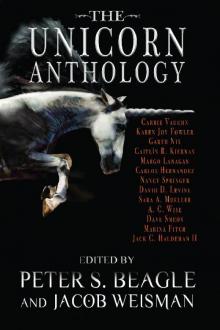 The Unicorn Anthology.indb
The Unicorn Anthology.indb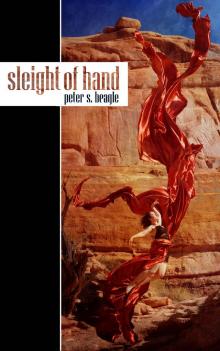 Sleight of Hand
Sleight of Hand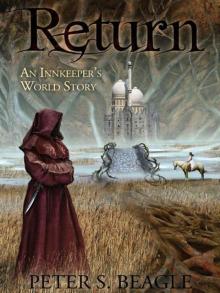 Return
Return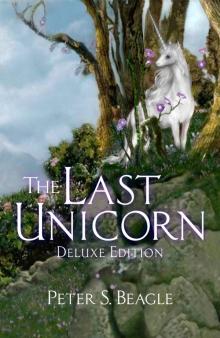 The Last Unicorn
The Last Unicorn Two Hearts
Two Hearts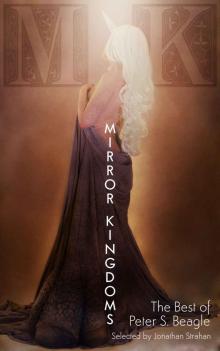 Mirror Kingdoms: The Best of Peter S. Beagle
Mirror Kingdoms: The Best of Peter S. Beagle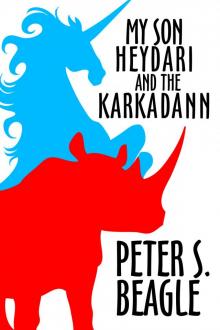 My Son Heydari and the Karkadann
My Son Heydari and the Karkadann The Magician of Karakosk, and Other Stories
The Magician of Karakosk, and Other Stories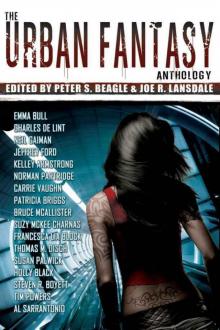 The Urban Fantasy Anthology
The Urban Fantasy Anthology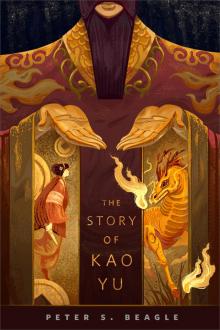 The Story of Kao Yu
The Story of Kao Yu The Karkadann Triangle
The Karkadann Triangle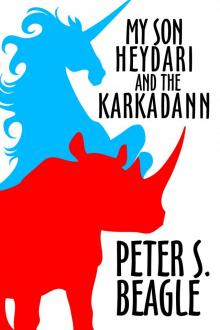 My Son and the Karkadann
My Son and the Karkadann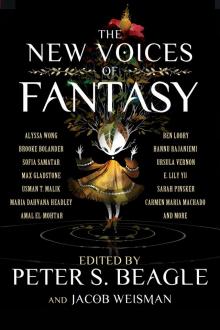 The New Voices of Fantasy
The New Voices of Fantasy A Dance for Emilia
A Dance for Emilia We Never Talk About My Brother
We Never Talk About My Brother The Folk Of The Air
The Folk Of The Air The Magician of Karakosk: Tales from the Innkeeper's World
The Magician of Karakosk: Tales from the Innkeeper's World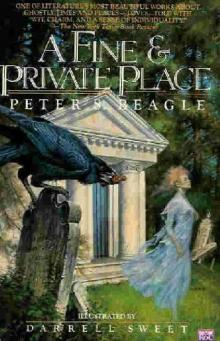 A Fine and Private Place
A Fine and Private Place Lila The Werewolf
Lila The Werewolf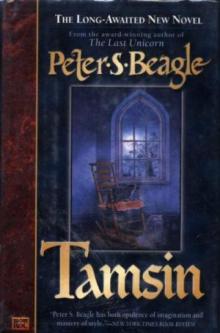 Tamsin
Tamsin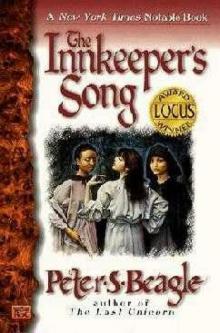 Innkeeper's Song
Innkeeper's Song